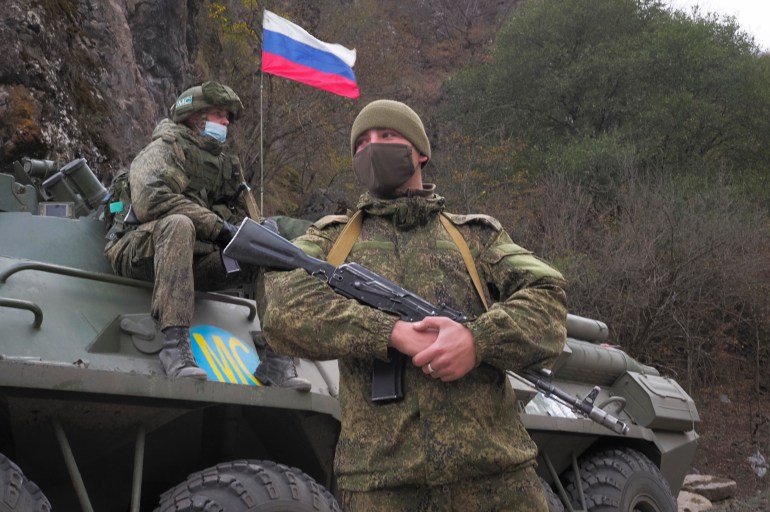Azerbaijan enters Nagorno-Karabakh district after peace deal
Azerbaijan’s military takes over one of three districts Armenia agreed to give back in the contested region as part of a peace deal.

Azerbaijan’s army says it has entered the district of Agdam, the first of three to be handed back by Armenia as part of a Russian-brokered peace deal to end the fighting in the Nagorno-Karabakh region.
“Units of the Azerbaijan Army entered the Agdam region on November 20,” Azerbaijan’s defence ministry said of the district, which had been controlled by Armenian separatists for nearly 30 years.
Keep reading
list of 3 itemsTurkey seeks approval to deploy peacekeepers in Azerbaijan
Ethnic Armenian villagers burn houses before Azerbaijan takeover
AFP journalists on Thursday saw Armenian soldiers destroying buildings of their headquarters in Agdam.
In the hours leading up to the handover, residents of the district set their homes on fire, leaving nothing behind for their longstanding rivals.
As part of last week’s peace deal, Armenia agreed to return some 15 to 20 percent of the Nagorno-Karabakh territory captured by Azerbaijan in recent fighting, including the historical town of Shusha.
Armenia will also hand over the Kalbajar district wedged between Nagorno-Karabakh and Armenia on November 25 and the Lachin district by December 1.
The exchange of territory was originally due to begin on Sunday, with Armenians in the Kalbajar district fleeing en masse before the official deadline for Azerbaijan’s takeover.
But Azerbaijan’s President Ilham Aliyev postponed the deadline by one week over “humanitarian” considerations.
Speaking from Agdam, Al Jazeera’s Osama Bin Javaid said the area has become a ghost town.
“This place was one of the most populated areas in Nagorno-Karabakh,” he said. “Almost 200,000 people used to lived here. All of them became displaced into Azerbaijan.”
“We’re speaking to many who want to return to Agdam but they say the area is not safe,” he continued.
“The government has to make sure all of the Armenian fighters are gone, the infrastructure is rebuilt, the area is cleared of mines and unexploded munitions so that people could go back and rebuild their lives.”
Tensions between the former Soviet Union countries reached new heights on September 27, when clashes between Azerbaijan and ethnic Armenian forces broke out over the Nagorno-Karabakh enclave and surrounding areas.
Nagorno-Karabakh is in Azerbaijan but has been dominated by ethnic Armenians for years.
Most of Azerbaijan’s southwestern district of Agdam has been under the control of Armenian separatists since 1993. Before the post-Soviet war, it was inhabited by some 130,000 people – mostly ethnic Azerbaijanis who were expelled from their homes.
The six-week conflict killed more than 1,000 people, including civilians on both sides.
On November 10, the two countries signed a Russia-brokered agreement to end the fighting and work towards a comprehensive resolution.
Russia boasts return of refugees
The Russian peacekeeping force of some 2,000 troops has deployed to the administrative centre of the region, Stepanakert, and set up checkpoints and observation posts along the strategic Lachin corridor connecting Nagorno-Karabakh with Armenia.
While Armenians in the provinces to be handed over to Azerbaijan have left in an exodus, the Russian mission on Thursday said it had bussed some 3,000 residents back to Stepanakert and other regions who had fled during the six weeks of heavy shelling.

Russia’s decisive role in the settlement has sidelined international players the United States and France, which brokered a ceasefire in the 1990s but failed to deliver a long-term resolution.
During the most recent conflict, France, the US and Russia attempted to broker three separate truces that collapsed as Armenia and Azerbaijan accused the other of violations.
French President Emmanuel Macron this week urged Russia to clarify “ambiguities” over the Moscow-brokered ceasefire, including Turkey’s role in the peacekeeping mission.
Azerbaijan has insisted on a prominent role for its staunch ally Turkey, which was widely accused by Western countries, Russia and Armenia of supplying Baku with mercenary fighters from Syria over the weeks of fighting.
The Kremlin has poured cold water on Ankara’s hopes of deploying peacekeepers alongside Russian troops in Nagorno-Karabakh and surrounding provinces and instead insisted that Turkey would observe the truce from monitoring posts in Azerbaijan.